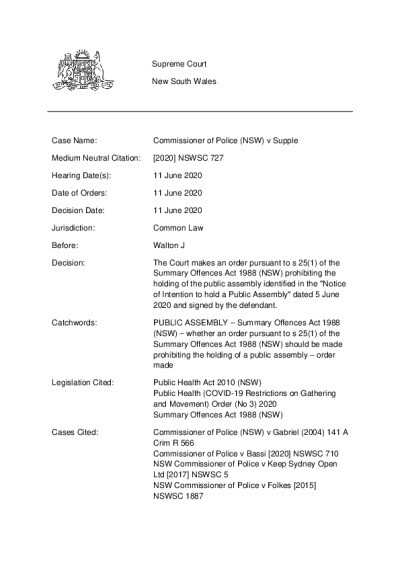
Date
Geographical Area
Pacific
Countries
Australia
Case Name
Commissioner of Police (NSW) v Supple
Case Reference
[2020] NSWSC 727
Name of Court
Supreme Court of New South Wales
Key Facts
In response to the rising number of Covid-19 cases within Australia and internationally, New South Wales issued Public Health (COVID-19 Restrictions on Gathering and Movement) Order (No.3) 2020. Under this Order, public gatherings of more than 10 persons were prohibited. However, a person wanting to hold a public assembly could submit a notice of intention to hold a public assembly, to which the Commissioner of Police could oppose.
Supple planned to hold a public assembly on 13 June 2020 to call on the Government to release refugees held in detention, especially those transferred from Papua New Guinea and Nauru, so submitted a notice of intention. The Commissioner of Police – the plaintiff – opposed the holding of this public assembly, so sought an order under s.25(1) of the Summary Offences Act 1988 (NSW) which would prohibit the defendant from holding the public assembly and procession. They identified two grounds for the opposition: i) it would contravene the Public Health Order; ii) it would bring about an unacceptable and unnecessary risk of attendees or other members of the public in the vicinity of the public assembly being exposed to the transmission of Covid-19. The Commissioner also relied on the need to maintain public order and that the welfare of police officers attending to the regulation of the protest would be adversely affected.
Supple planned to hold a public assembly on 13 June 2020 to call on the Government to release refugees held in detention, especially those transferred from Papua New Guinea and Nauru, so submitted a notice of intention. The Commissioner of Police – the plaintiff – opposed the holding of this public assembly, so sought an order under s.25(1) of the Summary Offences Act 1988 (NSW) which would prohibit the defendant from holding the public assembly and procession. They identified two grounds for the opposition: i) it would contravene the Public Health Order; ii) it would bring about an unacceptable and unnecessary risk of attendees or other members of the public in the vicinity of the public assembly being exposed to the transmission of Covid-19. The Commissioner also relied on the need to maintain public order and that the welfare of police officers attending to the regulation of the protest would be adversely affected.
Decision and Reasoning
The Court noted that s.25 does not stipulate the factors which must be taken into account when determining an application for a prohibition order. However, said that there must be a balancing exercise which, at a broad level, incorporates a balance between the rights of assembly and expression, with the need for democratic institutions to provide protection for the community in crises such as the health issues arising out of the Covid-19 pandemic.
Despite the risk of community transmission materialising at the event being low given the expected attendance of 200 people, the Court also noted that there are practical limits to people’s ability to comply with social distancing measures and, although the risks of transmission were low, there was a risk of an increase in cases associated with undiagnosed persons. Furthermore, the ease of restrictions occurring at the time did not favour the defendant, instead the Court stated that the reduction in restrictions needed to be moderate and gradual because of the infectious nature of the virus and the grave consequences of further transmission.
The Court held that the public health risks to the participants, public, and police, even in their mitigated form, outweighed the rights to public assembly and freedom of speech in this case.
Despite the risk of community transmission materialising at the event being low given the expected attendance of 200 people, the Court also noted that there are practical limits to people’s ability to comply with social distancing measures and, although the risks of transmission were low, there was a risk of an increase in cases associated with undiagnosed persons. Furthermore, the ease of restrictions occurring at the time did not favour the defendant, instead the Court stated that the reduction in restrictions needed to be moderate and gradual because of the infectious nature of the virus and the grave consequences of further transmission.
The Court held that the public health risks to the participants, public, and police, even in their mitigated form, outweighed the rights to public assembly and freedom of speech in this case.
Outcome
The Court made an order, pursuant to s.25(1) of the Act, prohibiting the holding of the public assembly.
Link
Disclaimer
This case law summary was developed as part of the Disaster Law Database (DISLAW) project, and is not an official record of the case.
Document
Document